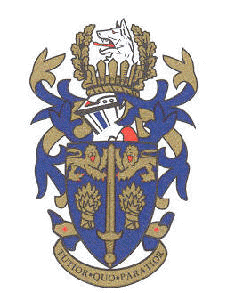Introduction
Chester was founded by the Romans in 75AD when they built a fort next to the river Dee and called it Deva. Roman law was imposed on society by the army but after the collapse of the Roman empire in the 4th century no clear picture emerges until the Anglo Saxons established themselves in the 7th century. Law was imposed by the community, all adult males having a responsibility to bring offenders to the court. In the 10th century Chester was made a burgh (fortified town) and the shyre was attached to it, forming what was later to become Cheshire.

 After the Norman invasion of 1066 Chester became part of the lands of
William of Avranches, Earl of Chester whose device, a wolf's head, still
adorns the modern Cheshire Constabulary arms. Feudal law was imposed
with the Lords of the Manor dispensing justice. In the 12th century the
great reforming King Henry II set up the Royal
Magistrate Courts and trial by jury began to replace trial by ordeal or combat.
After the Norman invasion of 1066 Chester became part of the lands of
William of Avranches, Earl of Chester whose device, a wolf's head, still
adorns the modern Cheshire Constabulary arms. Feudal law was imposed
with the Lords of the Manor dispensing justice. In the 12th century the
great reforming King Henry II set up the Royal
Magistrate Courts and trial by jury began to replace trial by ordeal or combat.
In 1285 an act required every hundred to appoint two constables to prevent defaults in towns and highways. In 1327 every county had to appoint men to guard the peace who, in 1361, became known as Justices of the Peace and still exist today. This system of unpaid constables bringing offenders before the county magistrates lasted for 450 years until the rise of the towns in the industrial revolution forced change.
Henry II (1133-1189)
Henry Plantagenet was one of the most brilliant and energetic of English kings. In 1150 he became ruler of Normandy and Anjou following the death of his father. In 1152 he acquired Aquitaine by marrying the equally brilliant and strong minded Eleanor, and in 1153 crossed to England to take the throne after the turmoil of civil war. He was 21 years old.Henry reasserted royal control, reigning in the barons and tearing down their fortresses. With his Chancellor, Thomas Becket, Henry reorganised the judicial system introducing new courts, new procedures, trial by jury and a prison system.
Peter O'Toole as Henry II in 'The Lion in Winter'
He asserted the overlordship in Ireland and enforced his control over the church, during which struggle Becket, then Archbishop of Canterbury, was murdered.The reforms initiated by Henry put England on the path of gradual social change by evolution from the strict feudal system rather than by revolution, and were the foundations of the stability of English society which has lasted to the present day.